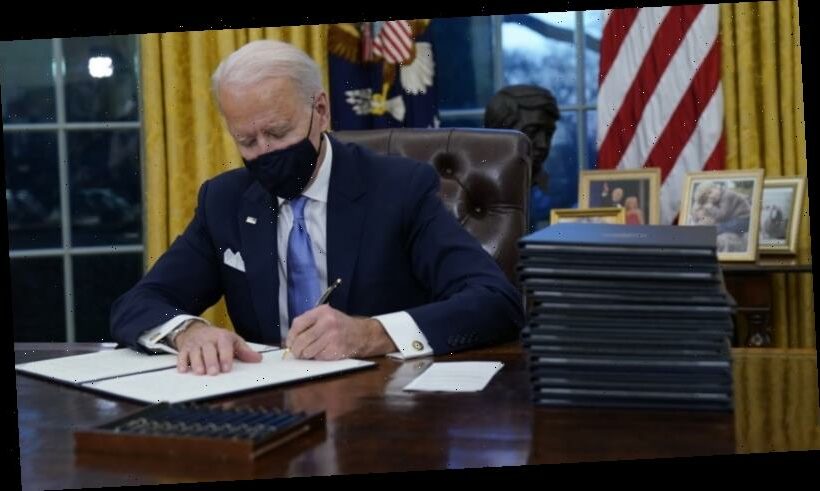Washington: Joe Biden’s first mission as US President was rhetorical – to ask for national unity, call for a renewed respect for facts and create a sense of optimism that America can begin to get on top of the coronavirus pandemic.
But after his inaugural speech and arrival at the White House, Biden’s focus quickly turned to policy. Through a flurry of 15 executive orders issued on Thursday (AEDT) from the Oval Office, Biden moved to reverse several of Donald Trump’s signature policies and signal his own governing priorities.
President Joe Biden signs his first executive orders in the Oval Office of the White House.Credit:AP
One of Biden’s most significant steps was rejoining the Paris climate accord – a decision that will take effect in 30 days. It was a sign to governments around the world that America is back in the international climate game after four years under Trump, who famously described climate change as a "hoax" and railed against multilateral organisations.
The decision was quickly welcomed by global leaders, with French President Emmanuel Macron saying on Twitter: "Welcome back to the Paris Agreement!"
Biden has also directed federal agencies to review more than 100 environmental rules put in place by the Trump administration – many of which made it easier for companies to emit greenhouse gases and other forms of pollution.
Biden also used executive action to block the Keystone XL pipeline, a controversial project that would bring huge quantities of oil from Canada to the US to be refined.
Canadian Prime Minister Justin Trudeau said in a statement that he was disappointed by the decision.
Biden has also halted oil and gas drilling in the Arctic National Wildlife Refuge and two expansive national monuments in Utah.
In another executive action issued on his first afternoon as President, Biden cancelled the national emergency order that Trump used to redirect money from the Pentagon to fund wall construction on the border with Mexico.
He also rescinded Trump’s controversial ban on travel to the US for residents from Muslim-majority countries such as Iran, Syria and Libya. And he bolstered protections for the Deferred Action for Childhood Arrivals (DACA) program which allows people who came to America illegally as young children to have work and residency permits.
On the coronavirus pandemic, Biden issued an order requiring the use of masks and social distancing in all federal buildings, on federal lands and by federal employees and contractors.
He has also extended a pause on student loan payments and a moratorium on evictions – policies put in place to ease the economic burden of the pandemic.
In another executive order, Biden halted the United States' departure from the World Health Organisation (WHO).
Trump announced in April that he was stopping payments to the WHO because he believed China exerted too much influence over the organisation despite America being its biggest funder.
The Biden administration has said it plans to roll out a total of 53 executive actions over the next 10 days.
In order to achieve other big goals – such as passing a giant COVID-19 relief bill and providing a pathway to citizenship with undocumented immigrants – Biden will need to do the hard slog of working with Congress to pass legislation.
But because Trump relied so heavily on executive action to implement his policies, there's plenty Biden can do with the stroke of a pen to dismantle his predecessor's legacy.
US power and politics
Understand the election result and its aftermath with expert analysis from US correspondent Matthew Knott. Sign up here.
Most Viewed in World
Source: Read Full Article

